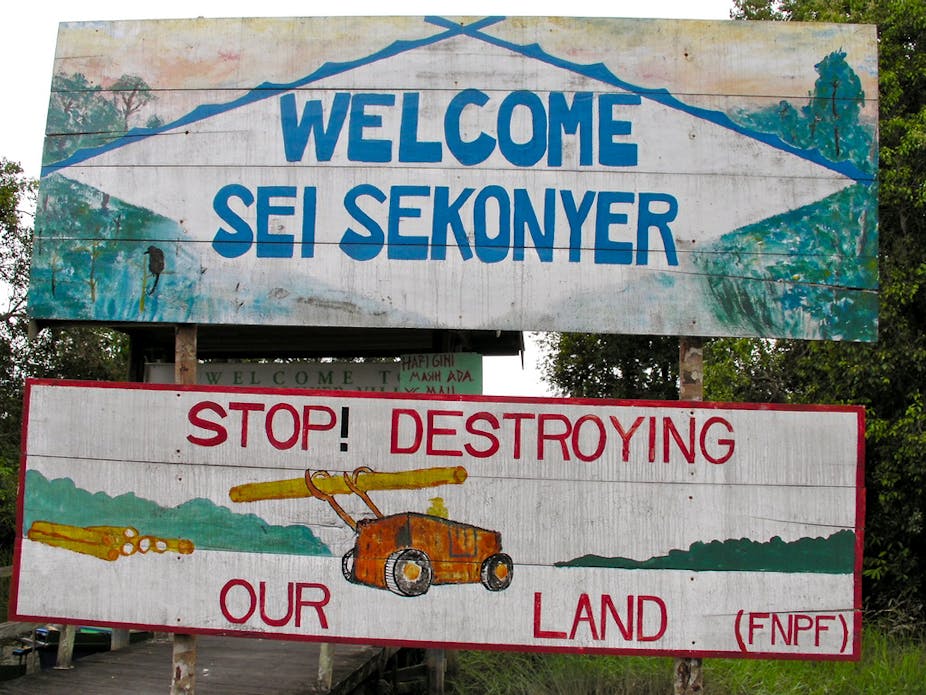Businesses, government and civil society met this month in Medan, Indonesia, for the 11th annual Roundtable meeting on sustainable palm oil. While orangutan conservation organisations dominated conversations about sustainability, another serious problem lingers: what to do with local people.
In 2011, 7.8 million hectares of Indonesia was taken up with palm oil plantations. These are predominantly in former forest areas which were either illegally logged or burned to clear the way for palm planting.
The industry has come under fire for years because of its role in destroying the habitat of the charismatic orangutan and other species of flora and fauna. But the indigenous people who live in forests also find themselves displaced by the massive growth in palm oil, and they attract much less attention.
In Indonesia there are many thousands of indigenous communities who live traditional or semi-traditional lives in the forest. They make their livelihood collecting non-timber forest products like berries, oils, fuelwood, medicinal plants or animals. Indigenous groups like the Suku Anak Dalam (sometimes called Batin Sembilan) in Sumatra lived like this for countless generations until the mid-20th century.
For many of these communities the forest is sacred and imbued with ancestral significance, having been home to countless generations before them.
When palm oil plantations are developed these people are displaced. Historically, the government has shifted them to more “civilised” homes and villages. They lose access to their livelihoods. The disconnection from their land threatens their culture, way of life and community and places them at severe risk of poverty as they find themselves with few transferable skills and few employment opportunities.

Businesses that sign up for certification by the Roundtable on Sustainable Palm Oil want to publicise their commitment to environmental and social sustainability (and capture “ethical” markets). To get certification, companies must adhere to principles of free, prior and informed consent (FPIC) when acquiring land.
This means that indigenous people whose forests are chopped or burned down to plant palm should be fully informed, in advance, of what the changes will be, and should be able to veto a palm oil development should they so choose. (The veto right is the difference between consent and consultation, another c-word sneakily ushered in to the acronym FPIC from time to time.)
But this consent is almost never achieved in the palm oil sector (or others to which it applies, such as mining). The questionable legality around the development of palm oil plantations means indigenous people rarely have any say at all over the destruction of their forest, and their eviction from their lands.
To address the reality that few palm oil plantations have been developed with free, prior and informed consent, the Roundtable dictates that member companies with disputes on their land can remain “certified sustainable” as long as they are doing something about resolving the dispute.
An increasingly common method of “doing something” is mediation between the company and the community to reach an agreement where the company allows the community to become, effectively, share-croppers. They can own some land, already planted with palm and with the forest destroyed, and can make their livelihood by selling the harvested fruit back to the company.
This is problematic in two obvious ways. One, companies can be certified as socially sustainably without actually having to reach any agreement with communities. And two, the best possible outcome is dependency.
In recent months, an even more troubling concern has emerged about the Roundtable’s approach to indigenous communities’ access to land. Wilmar, one of the world’s largest palm oil producers and the world’s largest palm oil trader, has employed a “cut and run” strategy in one of its plantations in the Sumatran province of Jambi.
Wilmar sold PT Asiatic Persada, a subsidiary, to two companies that are not members of the Round Table, at a crucial stage in a mediation between the company and a number of indigenous communities who own the land where the palm oil plantation grows.
These communities have engaged in more than a decade of activism and an intense and difficult two years of as-yet-unfinished mediation with the company to reclaim only a small portion of their lands. Wilmar, evidently finding the process too arduous, sold off the company before an agreement could be reached.
As the new companies are unwilling to continue the mediation, these communities find themselves back at square one. But Wilmar remains a member of the Roundtable and a certified sustainable palm oil producer.
The Roundtable on Sustainable Palm Oil is a controversial initiative. Its weaknesses are many. The fiction of free, prior and informed consent and respect for human and indigenous rights is just one of them.
Yet, the Roundtable may be the best option we have. Dedicated and skilled civil society organisations like Zoos Victoria, Oxfam, SawitWatch (“palm oil watch”, an Indonesian NGO) and Forest Peoples’ Program pressured palm oil companies at the meeting in Medan to improve their social and environmental responsibility practices. Indigenous communities from Jambi, along with other activists, protested loudly outside the venue. But the question remains: will the Roundtable do better to guarantee free, prior and informed consent, and prohibit cutting and running?

